12 Easy Website Builders for Beginners You Should Know
This article was assisted with AI. We may include links to partners.
Building a website can feel like a huge project, especially if you're not a developer. The good news is that you no longer need to know how to code to create a professional, functional, and beautiful online presence. The market is filled with tools designed specifically to make this process simple. This guide will help you find the perfect easy website builder for beginners, whether you're a small business owner, freelancer, or entrepreneur.
We will cut through the noise and provide a clear, practical analysis of the top platforms available. For many of these tools, knowing a bit about how they manage content can be helpful. Think of a website builder like a tool that helps you organize text and images without needing to code. Gaining a basic insight into understanding Content Management Systems will give you a better framework for choosing the right platform, as most builders are built on these principles.
This listicle dives deep into 12 leading options, including Wix, Squarespace, and our standout, the Solo AI Website Creator. Each review includes a detailed breakdown of key features, straightforward pricing, and an honest look at the pros and cons based on real-world use cases. You'll find screenshots for visual reference and direct links to get you started immediately. Our goal is to equip you with the knowledge to make a confident decision and launch your website with ease.
1. Solo AI Website Creator
Solo AI Website Creator stands out as an exceptionally strong choice for anyone seeking an easy website builder for beginners. It uses artificial intelligence to do most of the work for you, turning a few simple descriptions about your business into a fully functional, professionally designed website in minutes. This approach removes the typical design challenges, making it ideal for entrepreneurs, freelancers, and small business owners who need to get online quickly without a steep learning curve.
The platform's AI handles the heavy lifting, from selecting appropriate layouts and color schemes to finding high-quality images relevant to your industry. This automation ensures your site is not only visually appealing but also mobile-responsive from the start, meaning it will look great on any device, from a phone to a desktop computer.
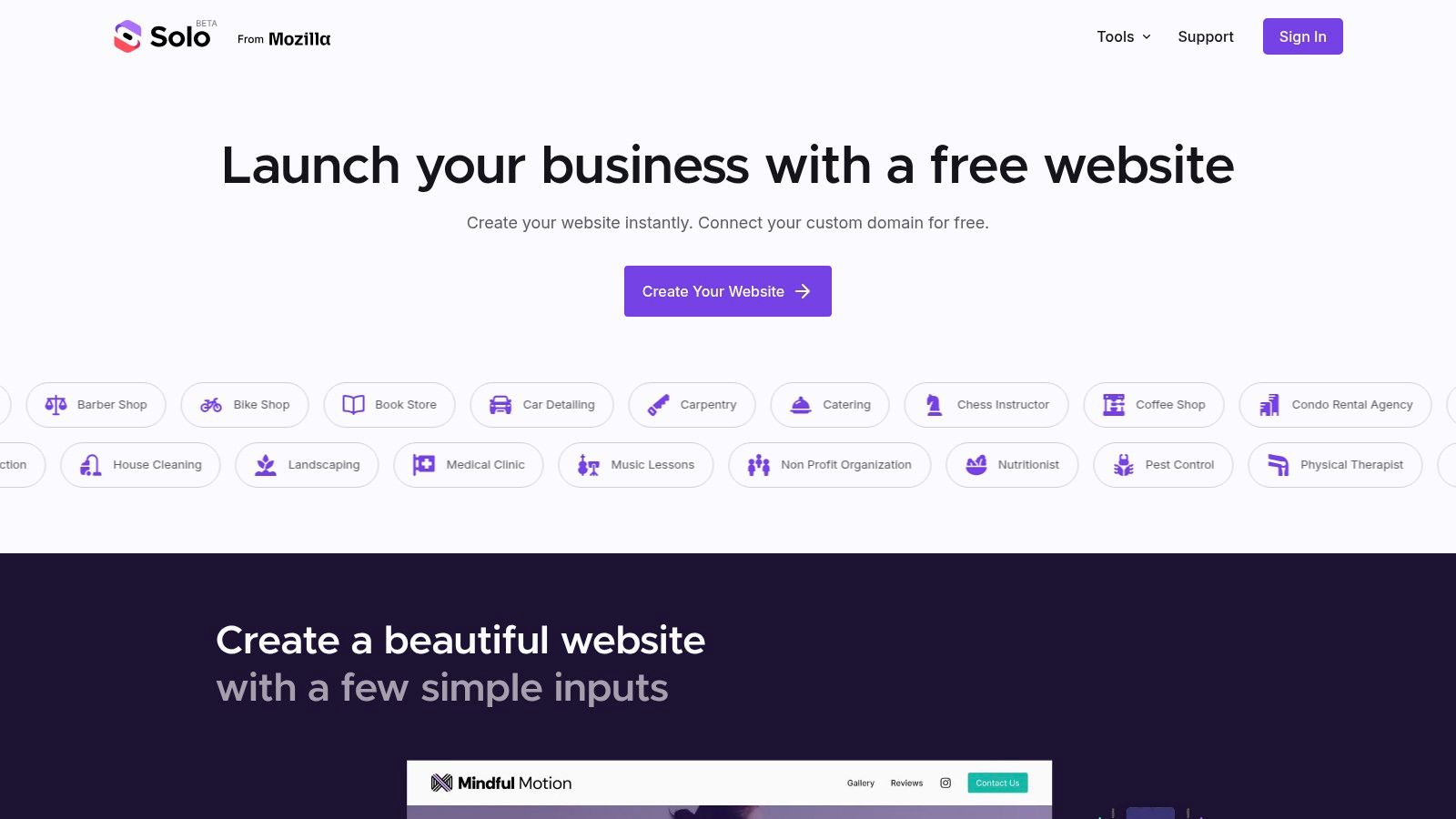
Core Features and Practical Applications
Solo AI Website Creator includes a powerful set of tools to help you manage and grow your business directly from your website.
- AI-Powered Design: Generate a custom website by simply describing your business. This is perfect for a consultant or a local shop owner who wants a professional site without hiring a designer.
- Integrated Business Tools: The platform includes built-in booking systems, client contact forms, and review importation. A therapist can use the booking feature to schedule appointments, while a restaurant can showcase customer testimonials imported directly from other platforms.
- Built-in SEO and Analytics: It comes with basic SEO features to help your site appear on search engines like Google. You can also connect Google Analytics to track visitor behavior and understand your audience better, a crucial step for any new business.
Why It Excels for Beginners
What makes Solo AI Website Creator a top-tier easy website builder for beginners is its truly free, all-in-one model. Unlike many competitors that advertise "free" plans with significant limitations, Solo provides free hosting and allows you to connect a custom domain (like yourbusiness.com) without ads or hidden fees. This removes the financial barrier for startups and nonprofits.
Actionable Tip: Before you launch, use the collaborative editing feature. Share a special link with a colleague or friend so they can view your site and leave comments directly on the page in real-time. This helps you get quick feedback to refine your message and design.
Pros:
- Completely free with no ads, including custom domain connection and hosting.
- AI-driven setup creates a tailored, professional website in under 20 minutes.
- Includes essential business tools like booking, contact forms, and review imports.
- Collaborative editing allows for seamless teamwork.
Cons:
- Lacks a fully integrated e-commerce store, requiring you to use payment links for product sales and manage orders manually.
- Extensive design customization beyond the AI-generated templates might require embedding custom code, which is a more advanced task.
Website: https://soloist.ai
2. Wix
Wix has earned its reputation as a major player in the website building space by offering an incredibly flexible yet user-friendly environment. It’s arguably the most versatile easy website builder for beginners who want extensive creative control without writing code. Its core strength is its unstructured, pixel-perfect drag-and-drop editor, which lets you place any element anywhere on the page, giving you complete design freedom.
This platform is a fantastic all-in-one solution for small businesses, freelancers, and artists. You can start with a simple portfolio and later add an online store, a booking system for appointments, or a blog, all without switching platforms. The Wix App Market further extends its functionality with hundreds of add-ons, from marketing tools to advanced analytics.
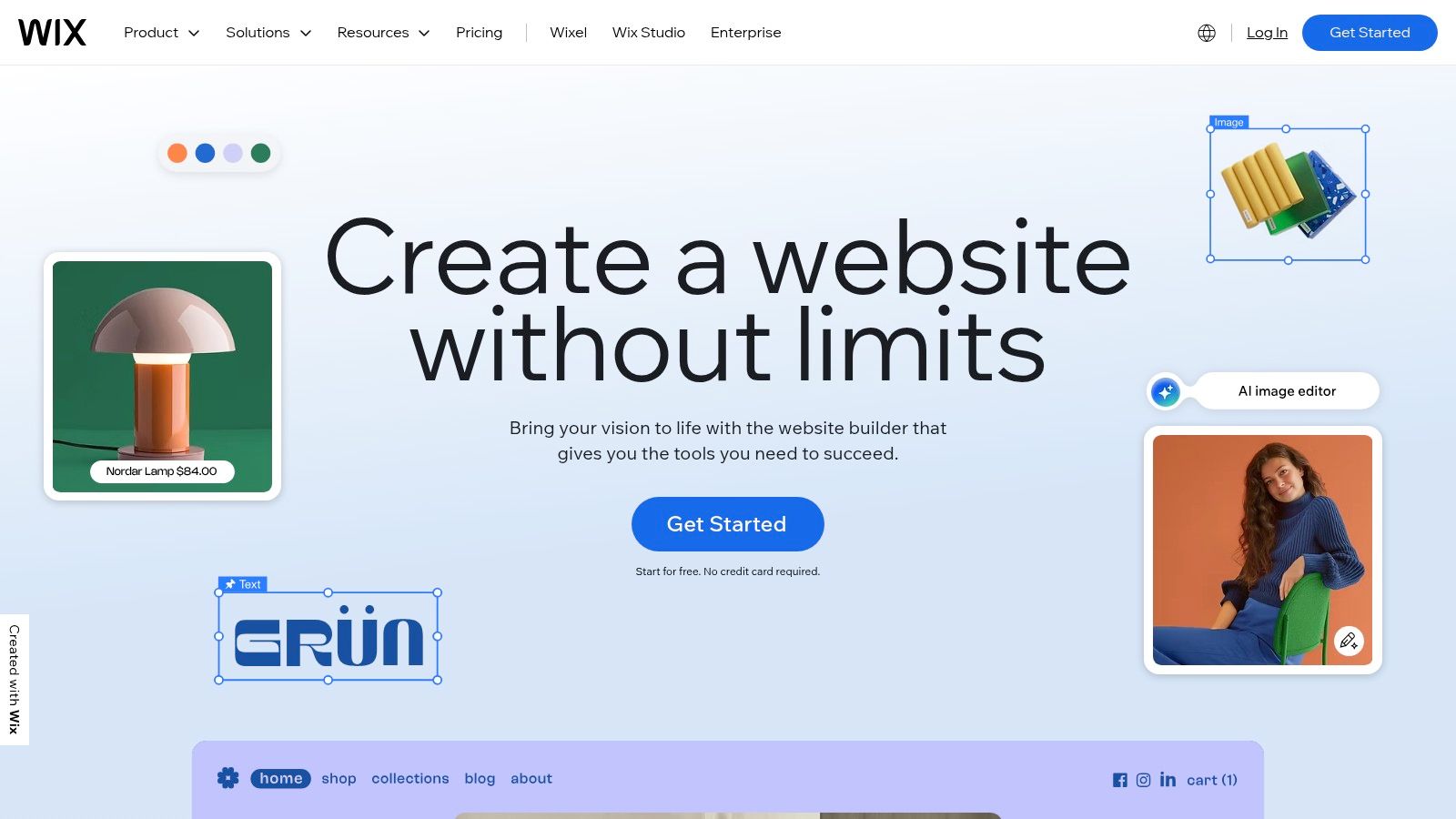
Key Features & User Experience
Wix serves all skill levels. For absolute beginners, the Wix ADI (Artificial Design Intelligence) can generate a complete website for you after you answer a few simple questions. More confident users can select one of over 900 professionally designed templates and customize it using the standard editor.
Actionable Tip: Use the "Preview" mode frequently to check how your site looks on both desktop and mobile. Since the Wix editor is so flexible, it's important to manually adjust elements to ensure they look good on smaller screens.
- Pros:
- Highly intuitive drag-and-drop interface.
- Massive library of templates and apps.
- Comprehensive built-in tools for SEO, ecommerce, and marketing.
- Cons:
- Once you choose a template and publish your site, you cannot switch to a different one without starting over.
- The sheer number of features can sometimes feel overwhelming for new users.
Website: https://www.wix.com
3. Squarespace
Squarespace is known for its award-winning, polished templates and streamlined editing experience. It is the go-to easy website builder for beginners who prioritize sophisticated design without needing to tweak every single detail. This platform is ideal for creatives, local businesses, bloggers, and those running simple online stores who want an elegant, professional-looking site with minimal effort.
The platform excels by providing a curated, all-in-one solution that includes hosting, domain registration, and an SSL certificate (which makes your site secure). Squarespace’s structured editor ensures that no matter how you arrange content blocks, the final design remains clean and mobile-responsive. This approach trades the total freedom of other builders for a guarantee of quality design, which is a major advantage for design-conscious beginners.
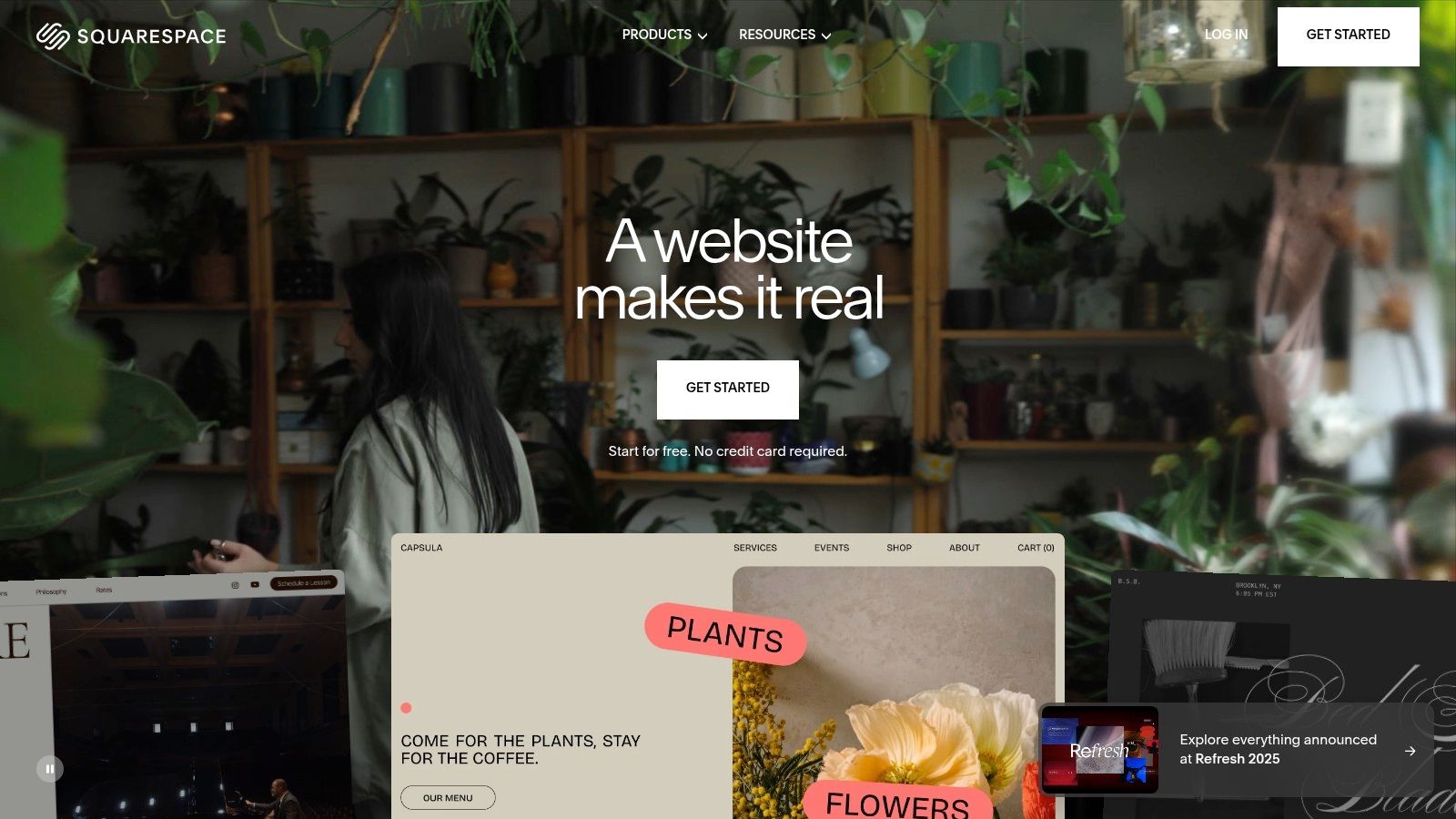
Key Features & User Experience
Squarespace’s user experience is built around its high-quality templates and an intuitive, section-based editor. Users select a template and then add or modify pre-designed content blocks, ensuring a consistent look and feel. Built-in tools for blogging, SEO, commerce, and scheduling (via Acuity) are seamlessly integrated, making it a powerful unified system.
Actionable Tip: Spend time exploring the "Style" settings for your chosen template. This is where you can easily change fonts, colors, and button styles across your entire site at once, which saves time and ensures a consistent brand look.
- Pros:
- Best-in-class template aesthetics and design quality.
- Simple, unified platform with excellent support materials.
- Great for blogs, portfolios, and light ecommerce.
- Cons:
- No permanent free plan; add-ons like email marketing can increase overall costs.
- Fewer third-party extensions compared to platforms like Wix or Shopify.
Website: https://www.squarespace.com
4. Weebly (by Square)
Weebly has long been a favorite for those seeking a straightforward, no-fuss website creation experience. Acquired by Square, it has evolved into an exceptionally easy website builder for beginners, particularly for individuals or small businesses needing simple online stores. Its core appeal is its gentle learning curve; you can build a functional, clean-looking website in under an hour without feeling overwhelmed by too many options.
The platform is excellent at providing the essentials without clutter. For a small retail shop, a local service provider, or a consultant, Weebly offers a direct path to getting online. The native integration with Square's payment processing system is a significant advantage for anyone planning to sell products or services, as it connects your online and in-person sales from the start.
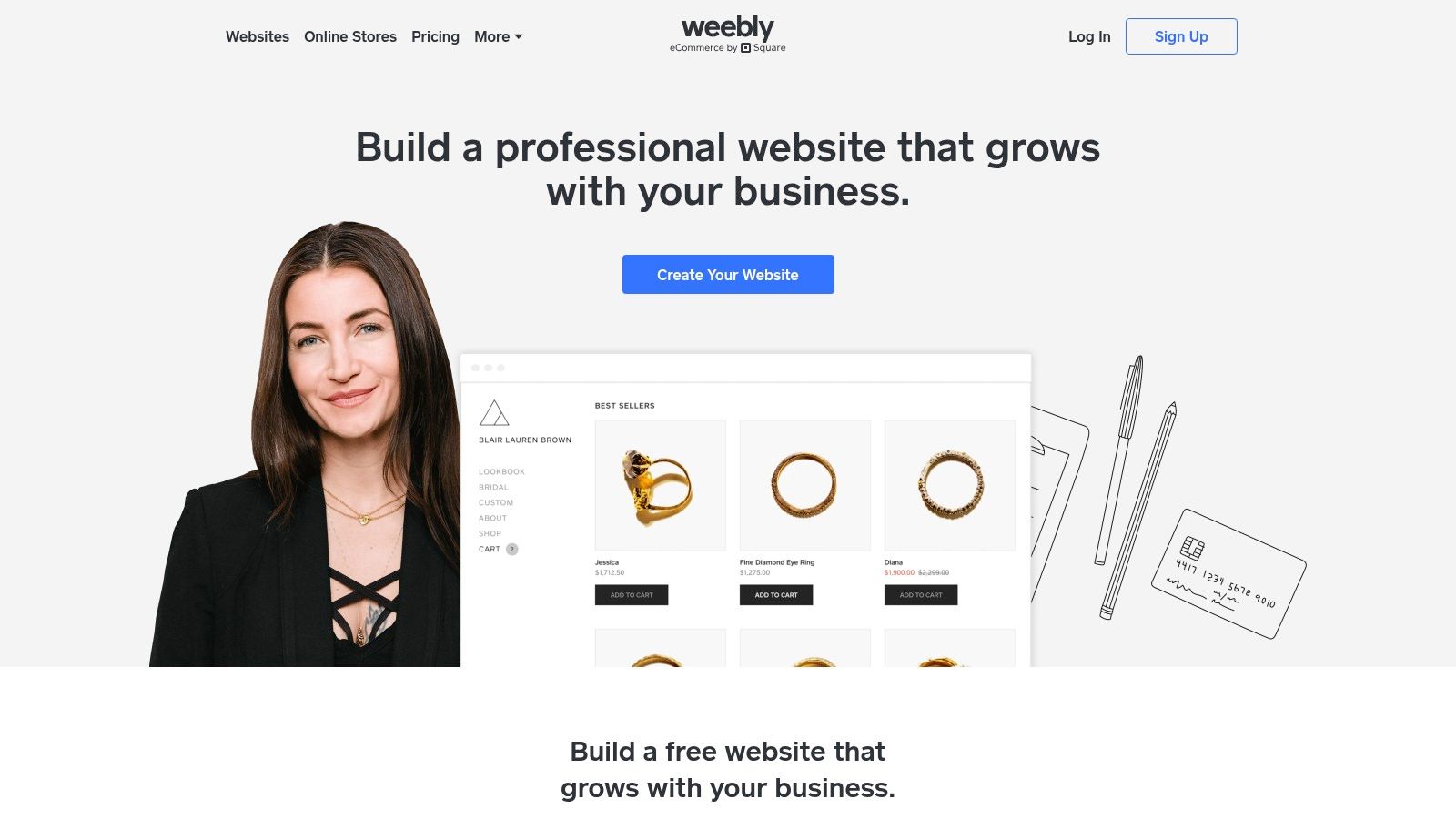
Key Features & User Experience
Weebly’s editor uses a structured, section-based approach that guides you through the building process, making it difficult to create a poorly designed page. While it offers less creative freedom than Wix, this limitation is a benefit for beginners who prefer a more guided experience. The free plan is generous, allowing you to build and publish a full site.
Actionable Tip: When setting up a store, use the "Item Options" feature to create variations for your products, such as different sizes or colors. This organizes your product page and makes it easier for customers to shop.
- Pros:
- Extremely low learning curve, perfect for absolute beginners.
- Seamless Square integration for simple ecommerce setups.
- Affordable paid plans for connecting a custom domain.
- Cons:
- Fewer template choices and slower feature updates compared to competitors.
- Advanced design customization is quite limited.
Website: https://www.weebly.com
5. Shopify
While many platforms add ecommerce as a feature, Shopify was built from the ground up specifically for online selling, making it an incredibly powerful yet easy website builder for beginners focused on retail. It provides a complete, end-to-end solution for launching and scaling an online store, handling everything from product listings and inventory management to secure payment processing and shipping logistics. Its reliability and scalability are why it powers millions of businesses worldwide.
This platform is the gold standard for anyone whose primary goal is to sell products online. Shopify simplifies complex processes like abandoned cart recovery (emailing customers who left without buying), tax calculations, and multi-channel selling (on social media and in-person via its Point of Sale system). Its streamlined dashboard gives you a clear overview of your sales, orders, and customer data, making business management straightforward. For those exploring different ecommerce options, it's useful to compare Shopify alternatives to find the perfect fit.

Key Features & User Experience
Shopify's user experience is designed for efficiency. The setup process guides new store owners through every step, from adding your first product to connecting a payment method. Its theme editor is simple to use, allowing for significant customization without needing technical skills.
Actionable Tip: Install the "Shop" app on your Shopify store. This connects your products to the Shop app used by millions of buyers, giving your new store an additional channel for discovery and sales right from the start.
- Pros:
- Fast, reliable, and highly scalable ecommerce platform.
- Excellent onboarding, 24/7 customer support, and extensive help resources.
- Massive ecosystem of themes and third-party apps for any function imaginable.
- Cons:
- Monthly fees plus transaction costs can add up, especially with third-party apps.
- Less design flexibility for content-heavy websites that aren't centered on a store.
Website: https://www.shopify.com
6. WordPress.com
WordPress.com offers a streamlined, hosted version of the world's most popular content management system. This makes it an excellent easy website builder for beginners who prioritize powerful blogging and content-heavy websites. It removes the technical work of self-hosting by handling security, updates, and backups for you. This platform is ideal for writers, bloggers, and small businesses who want a solid foundation that can grow significantly over time.
It provides a guided path into the expansive WordPress ecosystem. You can start on a free or low-cost plan to build a professional-looking blog or personal site. Later, you can upgrade to a business plan to unlock the full power of plugins (add-on features), custom themes, and advanced ecommerce. This scalability means you won’t outgrow the platform as your needs evolve. For a deeper dive into how it stacks up for commercial use, you can learn more about the best website builders for small businesses.
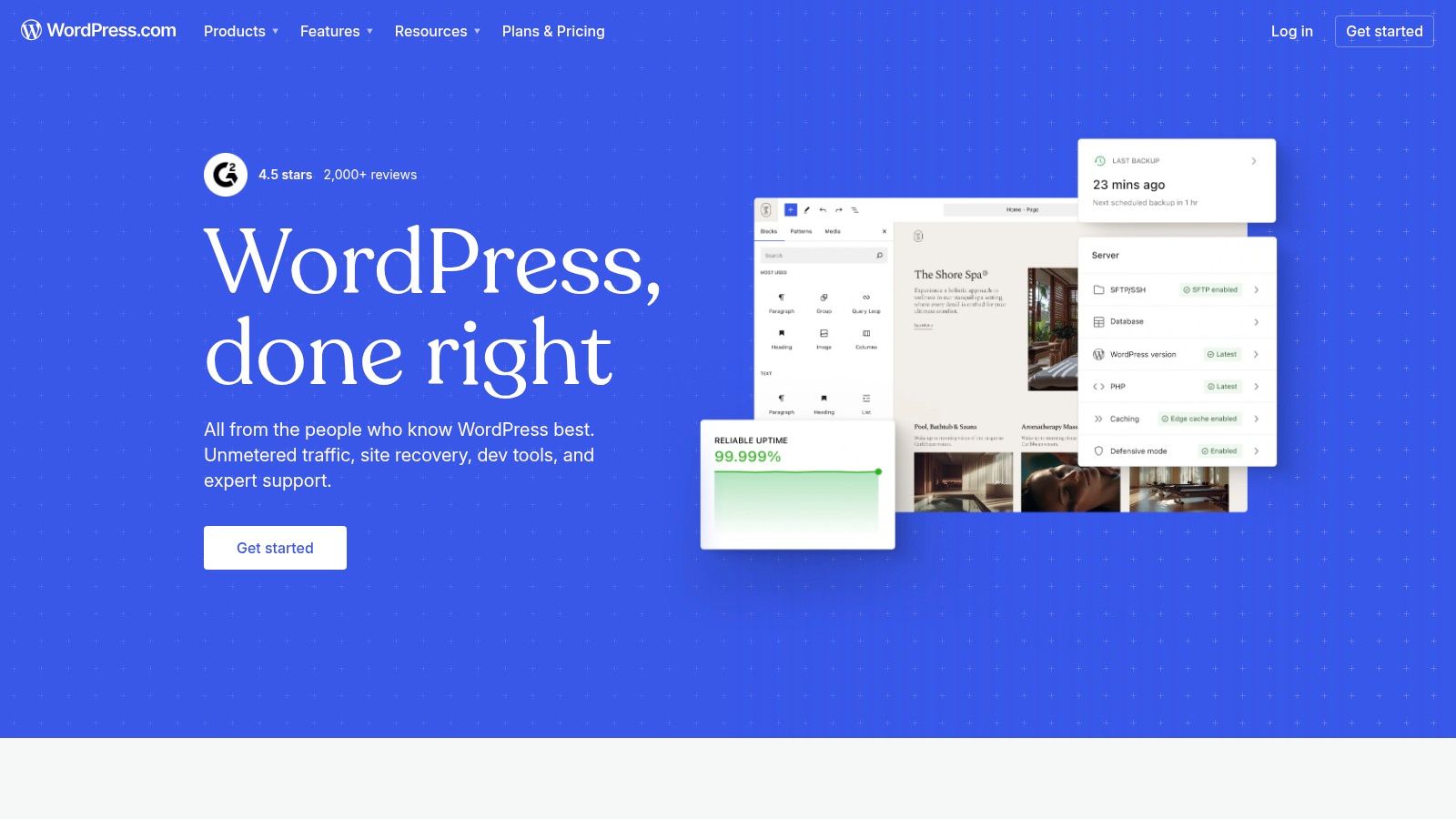
Key Features & User Experience
WordPress.com simplifies the website creation process with its modern block editor, which allows you to build pages visually by adding and arranging content "blocks." The initial setup is user-friendly, with a clear dashboard to manage your content, design, and settings. While it has a slightly steeper learning curve than pure drag-and-drop builders, its content management capabilities are second to none.
Actionable Tip: Start by using "Patterns." These are pre-designed collections of blocks (like a contact section or a photo gallery) that you can insert into any page. This helps you create professional-looking layouts quickly without building them from scratch.
- Pros:
- Unmatched blogging and content management tools.
- Highly scalable; can grow from a simple blog to a full-featured ecommerce site.
- Access to the vast WordPress plugin and theme ecosystem on higher-tier plans.
- Cons:
- The most powerful features, like installing plugins, require a more expensive Business plan.
- The interface has more settings than simpler builders, which can be confusing initially.
Website: https://wordpress.com
7. GoDaddy Website Builder (Airo)
GoDaddy is known for domains and hosting, but its Website Builder (now powered by Airo) is a strong choice for those who prioritize speed and simplicity. It’s an incredibly easy website builder for beginners who need a professional online presence launched in minutes, not days. The platform excels at bundling a website, domain, professional email, and marketing tools into one convenient package, making it a true one-stop shop.
This builder is ideal for service-based businesses like consultants, local shops, and contractors who need to get online quickly. Instead of a free-form drag-and-drop editor, GoDaddy uses a section-based approach where you add and customize pre-designed blocks. This guided process removes the guesswork from design, ensuring your site looks clean and professional on all devices without you having to manually adjust every element.
Key Features & User Experience
GoDaddy’s Airo AI streamlines the initial setup by generating a nearly complete website based on your industry and business name. From there, the experience is incredibly straightforward. The built-in tools for appointment scheduling, social media marketing, and email campaigns are integrated directly into your dashboard, saving you from needing separate services.
Actionable Tip: Immediately connect your business's social media accounts. GoDaddy's builder can then pull images from your feeds to use on your website and allows you to create social media posts directly from your website dashboard, saving you time.
- Pros:
- Extremely quick to launch a live site, often in under an hour.
- Solid customer support and an extensive knowledge base.
- A single provider for your domain, email, and website simplifies management.
- Cons:
- Less design flexibility compared to Wix or Squarespace.
- The app and extension ecosystem is much more limited.
Website: https://www.godaddy.com/website-builder
8. Webflow
Webflow occupies a unique space, acting as a bridge between simple website builders and professional web development. It's an easy website builder for beginners who are ambitious and willing to invest a little time into learning a more powerful system. Webflow's visual canvas translates your design decisions directly into clean, professional code, offering unparalleled control over how your site looks and behaves on different screen sizes without you writing a single line of code yourself.
This platform is ideal for designers, agencies, and businesses that need a professional, custom-looking website that can scale. While it presents a steeper learning curve than a typical drag-and-drop tool, the payoff is a website that looks and performs as if it were custom-coded. Its "Webflow University" provides some of the best video tutorials in the industry, making the learning process manageable.
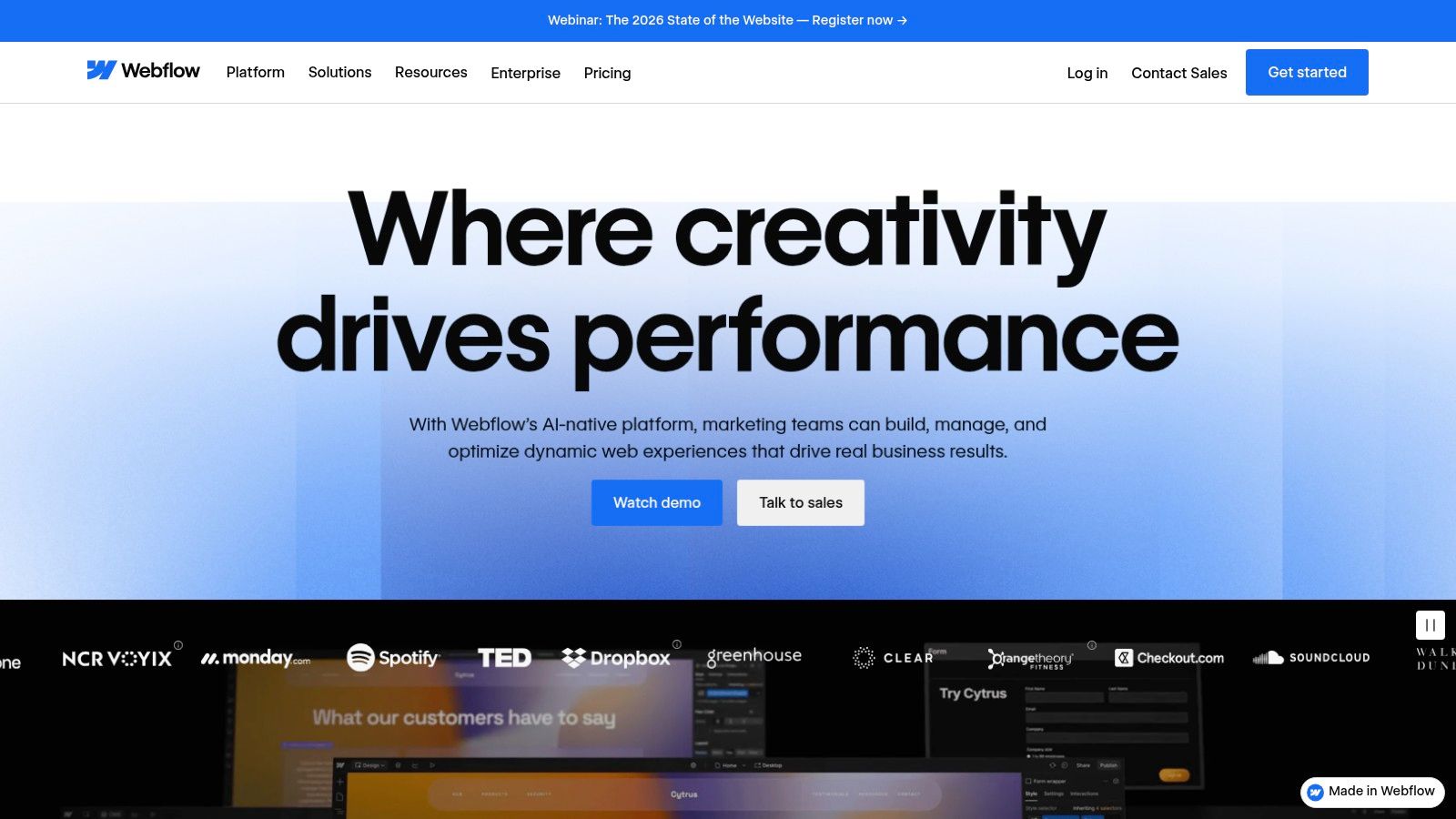
Key Features & User Experience
Webflow's interface looks more like professional design software (like Photoshop) than a standard website builder. It gives you precise control over every element's style, position, and behavior across different screen sizes.
Actionable Tip: For beginners, start with a free template from the Webflow marketplace. Open it in the designer and use the "Navigator" panel on the left to see how elements are structured and nested. This is the fastest way to learn how Webflow works by deconstructing a professional design.
- Pros:
- Professional-quality design and complete creative freedom.
- Powerful built-in CMS for blogs and dynamic content.
- Produces clean, high-quality code that is great for SEO.
- Cons:
- Has a significant learning curve compared to other builders on this list.
- Pricing can be complex, with separate plans for your account and for each individual site.
Website: https://webflow.com
9. Hostinger Website Builder (formerly Zyro)
Hostinger Website Builder, which absorbed the technology of Zyro, has become a top contender for those seeking an extremely budget-friendly yet capable platform. It's an excellent easy website builder for beginners who prioritize speed, simplicity, and affordability. The builder is bundled directly with Hostinger's high-quality web hosting, creating an all-in-one package that includes a free domain for the first year on annual plans, making it incredibly cost-effective.
This platform is ideal for entrepreneurs and small businesses launching their first online presence or ecommerce store. Its key advantage is the integration of powerful AI tools, which can generate a website, write content, and even create a logo for you. This dramatically speeds up the initial setup process. The ecommerce plans also feature zero transaction fees (though standard payment processor fees still apply), a major benefit for new online stores.
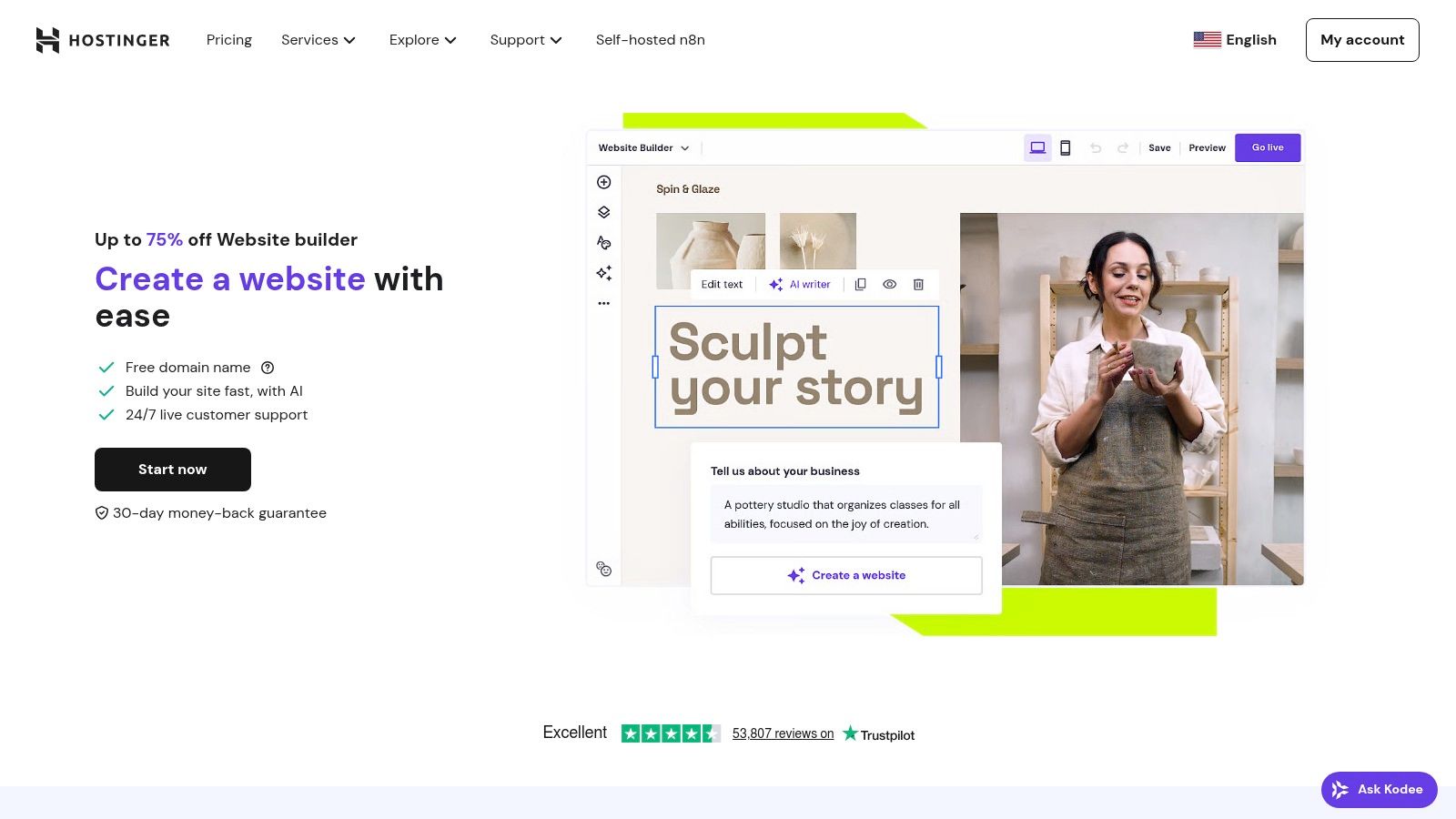
Key Features & User Experience
Hostinger focuses on a streamlined and intuitive user experience. The drag-and-drop editor is based on a grid system, which makes it easy to create well-aligned, clean layouts without the risk of accidentally misplacing elements. Users can start with a professionally designed template or use the AI generator for a custom-built foundation.
Actionable Tip: Use the built-in "AI Heatmap" tool. It analyzes your page design and predicts which areas will get the most visitor attention, helping you place your most important buttons or information in the most effective spots.
- Pros:
- Very low starting price, especially with promotional offers.
- Includes hosting, SSL certificate, and a free domain with annual plans.
- Fast and simple site setup thanks to helpful AI tools.
- Cons:
- Fewer advanced apps and third-party integrations than larger platforms.
- Less design nuance and flexibility compared to premium builders.
Website: https://www.hostinger.com/website-builder
10. Carrd
Carrd has carved out a unique niche by focusing exclusively on simplicity and speed for creating single-page websites. It's the ideal easy website builder for beginners who need a digital presence without the complexity of a full multi-page site. This platform is perfect for creating personal profiles, "link-in-bio" pages for social media, simple landing pages for a new project, or online business cards. Its strength lies in its streamlined, no-frills approach, allowing anyone to get a professional-looking site online in minutes.
The platform excels at what it does best: one-pagers. It's not trying to compete with all-in-one solutions but rather offers a focused, incredibly affordable tool for specific needs. If you need a quick, responsive, and stylish landing page to capture emails or direct traffic, Carrd is one of the fastest and most efficient options available.
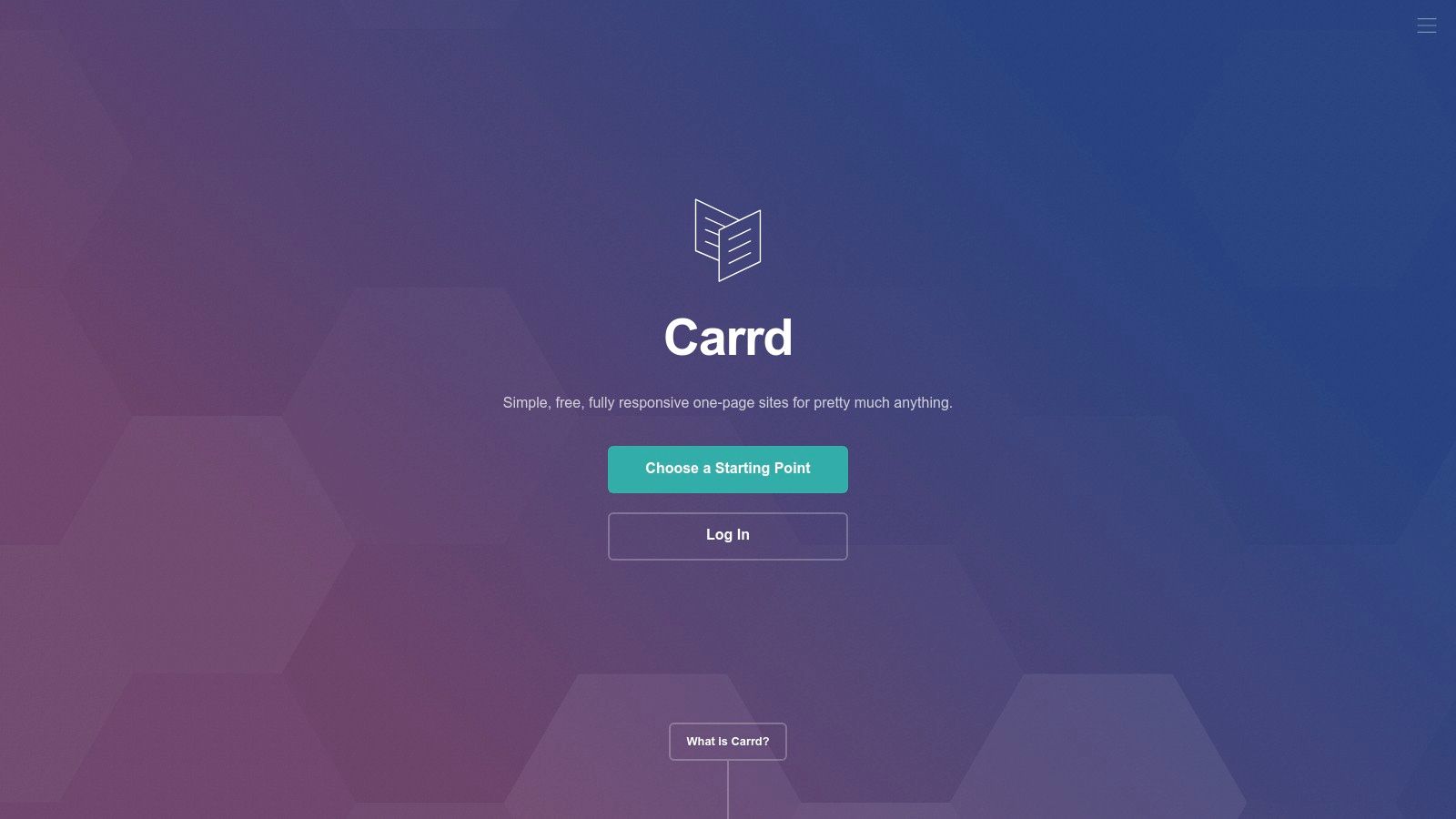
Key Features & User Experience
The user interface is incredibly straightforward, presenting all your tools and elements in a clean, non-intrusive sidebar. Building is as simple as adding "containers" and dropping in elements like text, images, forms, or buttons. Even on the free plan, you get access to all core features. For a very low annual fee, the Pro plans unlock custom domains, forms, embeds like PayPal buttons, and the ability to publish multiple sites.
Actionable Tip: Use the "Section Break" element to divide your single page into distinct parts (e.g., #about, #contact). Then, link buttons in your header to these sections. This creates smooth scrolling navigation, making your one-page site feel like a full website.
- Pros:
- Extremely affordable pricing, with a very generous free plan.
- Minimal learning curve enables you to launch a site in under an hour.
- Ideal for simple landing pages, portfolios, and "link-in-bio" sites.
- Cons:
- Strictly limited to one-page websites, making it unsuitable for blogs or complex businesses.
- Limited native integrations compared to larger, more comprehensive platforms.
Website: https://carrd.co
11. Square Online (by Square)
Square Online is a powerful, commerce-focused platform designed for businesses that operate both online and in-person. It is an exceptionally easy website builder for beginners already using or planning to use Square's payment systems for their physical store, restaurant, or service business. Its primary strength is the seamless synchronization between online sales and an in-person Point of Sale (POS) system, making inventory and sales management incredibly simple.
This builder is the go-to solution for local retailers, cafes, and service providers who need to get online quickly. It’s perfect for setting up features like online ordering for local pickup, delivery, or even QR code-based menus and payments. The platform eliminates the complexity of integrating separate payment and inventory systems by providing a unified ecosystem right from the start.
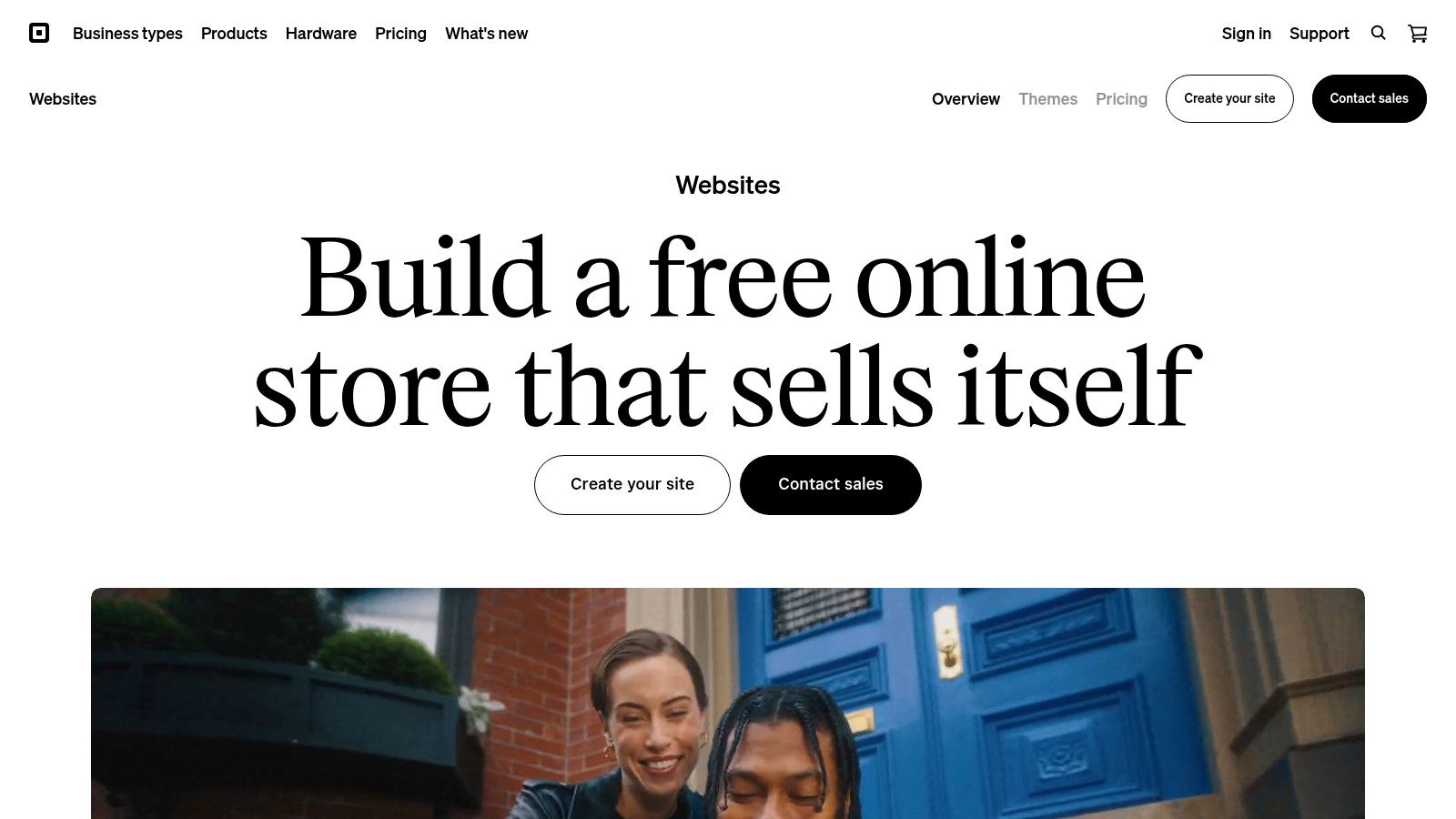
Key Features & User Experience
Setting up a store with Square Online is remarkably fast, as the platform prioritizes function over intricate design customization. The user experience is geared toward transaction efficiency, allowing businesses to launch a functional online store with minimal effort. Its free plan is a major draw, allowing you to start selling with no monthly fees—you only pay a standard transaction fee (2.9% + 30¢) on each sale.
Actionable Tip: Use the "Order Timing" feature to control when customers can place orders for pickup or delivery. For a restaurant, this means you can block off times when the kitchen is closed, preventing orders from coming in when you can't fulfill them.
- Pros:
- Seamless integration between online and in-person payments if using Square.
- Fast site setup with practical ecommerce features out of the box.
- Transparent transaction-based pricing on the free tier.
- Cons:
- Simpler design flexibility than Wix or Squarespace.
- Advanced features like abandoned cart recovery require upgrading to paid plans.
Website: https://squareup.com/online-store
12. Canva Websites
Canva extends its popular graphic design platform into the web creation space, offering one of the most visually intuitive routes to a live site. It’s an ideal easy website builder for beginners who are already familiar with the Canva interface and want to quickly publish a simple, design-forward website. The platform excels at creating single-page sites, online portfolios, event landing pages, and "link-in-bio" pages without a steep learning curve.
Its strength lies in its seamless workflow, allowing you to go from a design concept to a published website in minutes. By using its massive library of templates, stock photos, and design elements, you can create a visually stunning site that feels custom-made. It’s a perfect fit for users who prioritize looks and speed over complex functionality, like advanced ecommerce or extensive blogs.
Key Features & User Experience
Canva’s website creation process is as simple as making a presentation. You choose a template, customize it with a familiar drag-and-drop editor, and hit publish. The platform includes hosting and automatically ensures your site is responsive on mobile devices. For those on a paid plan, connecting a custom domain is straightforward, making your simple site look professional.
Actionable Tip: Embed a YouTube video or Google Map directly into your Canva design. Click "Apps" in the left-hand menu, search for YouTube or Google Maps, and paste the link. This adds interactive content to your page with just a few clicks.
- Pros:
- Extremely easy to use, especially for existing Canva users.
- Great for quick, visually rich one-page websites and presentations.
- Hosting is included, simplifying the launch process.
- Cons:
- Connecting a custom domain requires a paid Canva Pro subscription.
- Not suitable for complex ecommerce or heavy content management needs.
Website: https://www.canva.com/websites
Top 12 Easy Website Builders Comparison
| Platform | Core Features | User Experience & Quality | Value Proposition | Target Audience | Price |
|---|---|---|---|---|---|
| Solo AI Website Creator | AI-driven no-code website creator, custom domain & hosting, booking & contact forms, SEO optimization, Google Analytics | Very user-friendly, fast setup (minutes), mobile-responsive, collaborative editing | Completely free, no hidden fees, professional results | Entrepreneurs, freelancers, small businesses across industries | Free |
| Wix | Drag-and-drop editor, 900+ templates, AI tools, ecommerce, bookings, SEO tools | Beginner-friendly, scalable, lots of learning resources | Free plan to test, versatile for portfolios to stores | Small businesses, portfolios, online stores | Free plan; paid tiers start moderate |
| Squarespace | Designer templates, blogging, commerce, scheduling, email marketing, all-in-one hosting & SSL | Polished design, simple editing, good support | High-quality aesthetics, unified platform | Creatives, local businesses, bloggers | No permanent free plan; paid plans medium-high |
| Weebly (by Square) | Simple editor, ecommerce with Square payments, custom domain on paid tiers | Very easy for beginners, affordable plans | Low learning curve, ideal for simple sites & starter shops | Beginners, small stores | Free & affordable paid plans |
| Shopify | Hosted ecommerce, secure checkout, multi-channel sales, shipping discounts | Fast, reliable, scalable, strong support | Best for ecommerce, rich app ecosystem | Online sellers, retailers | Monthly fees + payment processing costs |
| WordPress.com | Themes & block editor, hosting, plugins (paid tiers), SEO tools, memberships | Scalable & powerful but more setup/config | Huge plugin/theme ecosystem, strong blogging | Bloggers, personal to business sites | Free basic; powerful features require paid plans |
| GoDaddy Website Builder | AI-assisted setup, section-based editor, marketing, SEO, appointment scheduling, ecommerce support | Very quick launch, solid support | All-in-one domain, email, marketing | Beginners wanting fast setup | Paid plans only; no free plan |
| Webflow | Visual designer, granular responsive control, CMS & ecommerce plans | Professional design, steep learning curve | Custom design without coding, scalable | Designers, motivated beginners | Free starter, paid plans moderate-high |
| Hostinger Website Builder | AI site generator, drag-and-drop, ecommerce with zero transaction fees | Fast setup, budget-friendly | Low cost, hosting & free domain included (annual) | Budget-conscious users, startups | Very low starting price (annual plans) |
| Carrd | Lightweight, mobile-friendly, custom domains on Pro, forms & embeds | Extremely simple, minimal curve | Very affordable, ideal for one-page sites | Personal pages, portfolios, landing pages | Very low-priced plans |
| Square Online | Online store builder, Square POS integration, online ordering & delivery support | Fast ecommerce setup, practical features | Seamless payments integration, free plan w/ transaction fees | Local retailers, restaurants | Free with transaction fees; paid plans available |
| Canva Websites | Drag-and-drop, templates & media library, responsive, collaboration & brand kits | Easy for Canva users, fast design-to-web | Hosting included, great for visual sites | Simple personal, event, portfolio sites | Free; custom domain needs paid plan |
Final Thoughts
Starting your first website can feel like a huge task, but modern tools have made it more accessible than ever. As we've explored, there are many options, each designed for different needs, skill levels, and business goals. The key takeaway is that the "best" easy website builder for beginners isn't a one-size-fits-all solution; it’s the one that aligns perfectly with your specific vision and resources.
From the AI-driven simplicity of Solo AI Website Creator and GoDaddy's Airo to the creative powerhouse of Wix and the design-centric elegance of Squarespace, you have a spectrum of choices. Your decision should be a practical one, moving beyond just the surface-level appeal of a template.
How to Choose Your Perfect Website Builder
To make the right choice, revisit your core goals. Don't get distracted by a long list of features you may never use. Instead, focus on the fundamentals that will drive your success.
Consider these critical questions before you commit:
- What is my primary goal? Are you selling products (Shopify, Square Online), showcasing a portfolio (Squarespace, Canva), booking appointments (Wix, GoDaddy), or building a simple online brochure (Carrd)? Your main purpose should guide your selection.
- How much time can I realistically invest? If you need a professional site live in minutes, an AI-powered tool like Solo AI Website Creator is your best bet. If you enjoy the design process and have more time, a platform like Wix or Webflow might be more rewarding.
- What is my long-term vision? Think about where you want your business to be in a year. Will you need advanced marketing tools, a blog, or expanded e-commerce capabilities? Choose a platform that can grow with you, like WordPress.com or Shopify, to avoid a complicated migration down the road.
- What is my budget? Be honest about your financial commitment. While free plans are excellent for testing, they often come with limitations like ads and non-custom domains. Factor in the cost of the plan that includes the features you truly need to operate professionally.
Your Next Steps to a Live Website
The most important step is to simply begin. Many of the tools we've discussed, including Wix, Weebly, and Canva, offer free versions or trials. Use these to your advantage. Test drive two or three of your top contenders to get a real feel for their interface and workflow. What looks good on paper might not feel intuitive in practice.
Remember, the goal is to launch, not to achieve perfection on day one. An effective website is a living entity that evolves with your business. Choose the easy website builder for beginners that empowers you to get started quickly, and then focus on iterating and improving over time based on real user feedback. You have the tools; now it's time to build your digital presence.
Ready to skip the learning curve and launch a professional website in minutes? Solo AI Website Creator uses advanced AI to build a complete, ready-to-publish website tailored to your business from a simple description. Experience the fastest and easiest way to get online by trying Solo AI Website Creator today.
